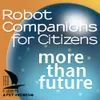Current Projects
Name: European Training Network on PErsonalized Robotics as SErvice Oriented applications
| Name: | European Training Network on PErsonalized Robotics as SErvice Oriented applications |
| Funded by: | This project has received funding from the European Union’s Horizon 2020 research and innovation programme under the Marie Skłodowska-Curie grant agreement No 955778 |
| Funding period: | 2021 - 2024 |
Coordinator: Silvia Rossi (Interdepartmental Center for Advances in Robotic Surgery (ICAROS), University of Naples Federico II) PERSEO, the European Training Network on Personalized Robotics as Service Oriented applications, is dedicated to preparing a new generation of interdisciplinary researchers and professionals equipped with entrepreneurial skills to tackle the challenges of the emerging personal robotics market. Our focus lies in developing tailored robot capabilities that can be accessed as Cloud Services for various applications such as companionship, rehabilitation, and education. This field presents unique hurdles, particularly in crafting personalized robot behavior to suit individual user preferences. Please click the link for more information: https://www.perseo.eu/ |
| Name: | Examining robustness of bipedal robot walking with artificial sensitive skin |
| Funded by: | DFG |
| Funding period: | 2023-2027 |
Coordinator: Prof. Gordon Cheng The objective of this project is to enable humanoid robots to walk over uneven and narrow terrains that has not been possible with ankle joint torque-force sensors (on standard humanoid robot) to date. If humanoid robots are to be used more in environments made for human beings, they need to be able to walk, balance on various kinds of ground and surfaces. Only this approach can ensure a smooth integration of robotic systems in the human environment. |

| Name: | Skin and whole-body motion of large objects with torque and position controlled humanoid robots (HoRoPo) |
| Funded by: | DFG (ANR on the French side) |
| Funding period: | 2023-2027 |
Coordinator: Prof. Gordon Cheng and Dr. Olivier Stasse, LAAS-CNRS The goal of HoRoPo is to develop a new scientific paradigm for motion generation considering humanoid robots equipped with a skin. The aim is to manipulate large objects using torque-controlled and non-torque-controlled humanoid robots and comparing the limitations of the two approaches and to fuse them to a uniformed controller. |
| Name: | eXprt - Exoskeleton and Wearables Enhanced Prevention and Treatment |
| Funded by: | TUM |
| Funding period: | 2022-2027 |
Coordinator: Prof. Gordon Cheng and Prof. Joachim Hermsdörfer The Innovation Network eXprt brings together a multidisciplinary team to create a synergy of engineering, neuroscience, and clinical neurology to develop wearable technologies. The project provides tools to sensitively identify sensorimotor and cognitive impairments in everyday life. Through the power of neuroengineering, the results of eXprt will efficiently compensate for lost motor function and, therefore, prevent deterioration and improve the quality of life of individuals in need. |
| Name: | Computational Models of Multisensory Integration by Upper Limb in Humanoids and Amputees (COMMI) |
| Funded by: | BMBF (Federal Ministry of Education and Research) and National Science Foundation (USA) |
| Funding period: | 2022-2025 |
Coordinated project with the Johns Hopkins University (Prof. Nitish V. Thakor) COMMI's goal is to equip the prosthetic and humanoid hands with tactile and temperature sensors at the fingertip. We will use electro-cutaneous feedback to show that an amputee can discriminate the two information streams and a natural action. Analogously, the humanoid at TUM will do the same in a reflexive control system. |
| Name: | TUM IAS Hans Fischer Senior Fellow (awarded by the Siemens AG) Prof. Nitish Thakor |
| Funded by: | TUM Institute of Advanced Studies |
| Funding period: | 2021-2024 |
Focus Group on “Giving Sensation, Perception and Cognition to Robotics – Inspirations from Neuroengineering Approaches” will invent the next generation bio/human inspired sensors and sensor encoding system, and human hand-like prosthesis and robotic manipulators.
|

| Name: | Collaborative research center (SFB) on Everyday Activity Science and Engineering (EASE) |
|---|---|
| Funded by: | DFG |
| Funding period: | 2017-2024 |
| Everyday Activity Science and Engineering (EASE) is the study of the design, realization, and analysis of information processing models that enable robotic agents (and humans) to master complex human-scale manipulation tasks that are mundane and routine. EASE not only investigates action selection and control but also the methods needed to acquire the knowledge, skills, and competence required for flexible, reliable, and efficient mastery of these activities. | |
| Coordinator | University Bremen |
| Name: | Brain-To-Sound Computer Interfaces: Neurofeedback of Music for Entertainment, Interaction and Neurorehabilitation |
| Funded by: | TUM International Graduate School of Science and Engineering (IGSSE) |
| Funding period: | 2017-2021 |
| In engineering, Brain-Computer Interfaces (BCI) and Neurofeedback applications have been developed for providing patients with alternative pathways of communication and interaction, as well as innovative neuro-rehabilitation treatment protocols. Bridging these two fields, the goal of this project is the interdisciplinary development of a Brain-Computer Interface platform that allows human subjects to interact directly and continuously with synthesized sound and music stimuli. |
Past Projects
| Name: | Artificial Intelligence and the Mobility of the Future – Between Trust and Control |
|---|---|
| Funded by: | VolkswagenStiftung |
| Funding period: | 2020-2021 |
Connected and autonomous vehicles (CAV) could play a key role in granting sustainable and afford-able mobility on societal scale. To exploit the disruptive potential of CAV responsibly, it is vital for the technology-induced change to be socially rooted. Hence, we aim at investigating how individual and system inherent factors influence trust in and willingness to relinquish control to CAV. Beyond that, we want to explore philosophical and ethical questions stemming from the new dimensions of trust and control opened up by the interaction with objects to which human qualities like “intelligence” or “fallibility” are being attributed. Coordinator: Hochschule Coburg |
| Name: | Open Source Balancing and Walking Control Framework for Humanoid Robots in ROS – OpenWalker |
|---|---|
| Funded by: | European Union, H2020 |
| Funding period: | 2019-2020 |
Open Walker is a Focused Technical Project (FTP) in the ROSIN project, funded by the EU in the H2020 program. OpenWalker’s aim is to satisfy the necessity of a framework for balance and walking controllers, and to easily adapt to any biped robot architecture. OpenWalker will provide the tools for developers and contributors to implement their own walking controllers without having to create the whole framework for every robot they use thus reducing implementation time. Partner in the project is PAL Robotics. ROSIN aims to create a collection of open-source, quality-assured software components for real-world robot applications1. Its starting points are the existing ROS-Industrial framework and community. One of the instruments used by ROSIN to progress towards the stated goal consists in the concept of Focused Technical Projects (FTPs). |
| Name: | TUM IAS Hans Fischer Senior Fellow Prof. Takao Someya, Focus Group on Artificial Electronic Skin |
| Funded by: | TUM Institute of Advanced Studies |
| Funding period: | 2017-2020 |
The Focus Group on Artificial Electronic Skin aims at the implementation of a novel paradigm that could lead to important advances in robotics. This research pursues the creation of an artificial electronic skin that imitates the properties of human skin using innovative fabrication techniques of printed electronics.
|

| Name: | SELFCEPTION |
| Funded by: | H2020 - Marie Skłodowska-Curie Individual Fellowship granted by the European Union |
| Funding Period: | 2017-2019 To develop robots that learn to recognize their own body and distinguish it from other elements in the environment, is the goal of the SELFCEPTION research project. |
| Name: | Factory-in-a-Day |
| Funded by: | FP7-FET |
| Funding Period: | 2013-2017 |
| The project Factory-in-a-Day aims at improving the competitiveness of European manufacturing SMEs by removing the primary obstacle for robot automation: installation time and installation cost. |
| Name: | Helmholtz Young Investigators Group |
| Funded by: | FP7-FET |
| Funding Period: | 2011-2016 |
| This Helmholtz Young Investigators Group project, titled “Dynamic Control of Legged Humanoid Robots”, covers key aspects of humanoid robot control by focusing on advanced motion skills for locomotion and physical interaction. |
| Name: | CONTEST-ITN |
| Funded by: | FP7-FET |
| Funding Period: | 2012-2015 |
CONTEST (COllaborative Network for Training in Electronic Skin Technology) is a multi-site initial training network (ITN) funded by European Commission to work in the fast expanding field of flexible and large area electronics and applications. It pushes research frontiers towards:
|

| Name: | BCCN-Munich |
| Funded by: | BMBF |
| Funding Period: | 2010-2015 |
| The Bernstein Center for Computational Neuroscience Munich is home of various groups from disciplines ranging from biology, medicine and psychology to physics, engineering and computer science. Involved are Scientists from the Ludwig-Maximilians-Universität München (LMU), the Technische Universität München (TUM), the Max-Planck Institute of Neurobiology, MED-EL and NPI Electronic. |

| Name: | CA-Robocom |
| Funded by: | FP7-FET |
| Funding Period: | 2012-2013 |
| The RoboCom initiative is a unique federated multi-disciplinary endeavor to develop and deploy a new generation of robots, the Robot Companions, that will have a direct impact on European society and beyond. |

| Name: | COTESYS |
| Funded by: | DFG |
| Funding Period: | 2005-2014 |
| Cognitive capabilities such as perception, reasoning, learning, and planning turn technical systems into systems that "know what they are doing". Starting from the human brain the Cluster of Excellence "CoTeSys" investigates cognition for technical systems such as vehicles, robots, and factories. Technical systems that are cognitive will be much easier to interact and cooperate with, and will be more robust, flexible, and efficient. |


